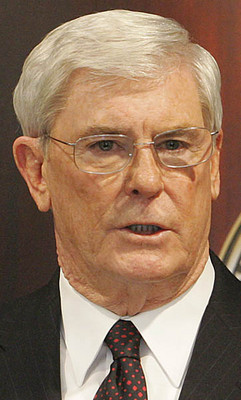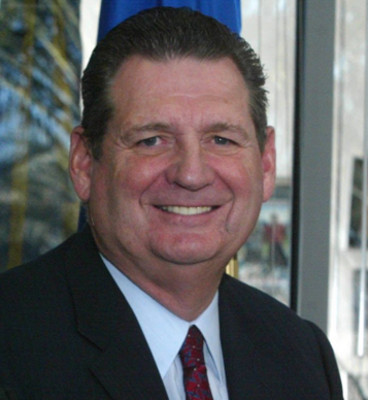Gibbons situation nothing unique
CARSON CITY -- Former Govs. Kenny Guinn and Bob Miller say the criticism Gov. Jim Gibbons faces from legislators and others as he prepares to cut state spending is nothing new. They both faced stinging barbs when they cut state budgets.
"We kept people in the loop, but ultimately I made the decision," said Miller, who cut state spending by $173 million in January and July 1992. "I took the heat for the cuts."
"He (Gibbons) is going through the same cycle past governors went through," Guinn said Friday. "Legislators aren't going to come out and say 'Let's cut this.' They want the governor to make the cuts."
And when you make the cuts, they will criticize you for them, Guinn said.
Gibbons, however, already has come under fire, although he will not announce before January specifically where he will cut state spending by more than $285 million.
Gibbons has exempted public education, the prison system, public safety agencies and children's programs from any cuts.
Some of the strongest criticism over the potential cuts has come from Chancellor Jim Rogers, who is concerned that the governor might reduce Nevada System of Higher Education spending by $64 million.
Unlike Miller and Guinn, Gibbons did not have discussions with legislators before announcing Oct. 15 that state revenue was dropping and cuts would be necessary.
Miller said he faced a barrage of criticism because he fired state workers.
Miller said the workers were fired because the State of Nevada Employees Association objected to his plan to defer a planned 4 percent pay increase and sued to secure the increase for state workers.
If he could have delayed the increase, Miller said, then no one would have been fired.
Guinn said Friday he didn't remember a time when he failed to consult key legislators before publicly announcing that budget cuts were needed.
As governor in 2001-02, Guinn was forced to cut state spending by $87 million after a recession caused by the Sept. 11, 2001, terrorist attacks in New York and Washington, D.C.
His cuts would have been more severe, but he secured legislative approval to spend $135 million in rainy day funds to lessen the blow on state agencies.
The Legislature created the rainy day fund to handle such financial emergencies.
Assembly Speaker Barbara Buckley, D-Las Vegas, said earlier his month that Gibbons could avoid most cuts if he delayed construction of new state buildings and dipped into the state's $300 million rainy day fund.
Guinn remembers meeting privately with then-Assembly Speaker Richard Perkins, D-Henderson, and state Senate Majority Leader Bill Raggio, R-Reno, telling them revenue was dropping and seeking suggestions where he could make cuts.
"I never got anything back," Guinn said. "Every time you cut you will get criticized by someone."
Gibbons was criticized by Democratic legislators earlier this week for failing to involve them more intimately in the process, which will lead to his decision in January on where to cut state spending.
Sales tax revenue, in particular, has fallen because of a 50 percent decline in home purchases, along with declining purchases of furniture and home furnishings, and motor vehicles.
The Gibbons administration refused during an Interim Finance Committee meeting Tuesday to give legislators lists prepared by selected state agency directors that show where they would cut their spending by 5 percent.
State Sen. Bob Coffin, D-Las Vegas, said past governors made legislators aware of what was happening and sought their input before making public announcements that cuts were imminent.
Raggio, however, praised Gibbons for meeting with legislators and local government leaders on Nov. 7 and asking for suggestions on where cuts could be made.
Gibbons spokeswoman Melissa Subbotin said Thursday that Gibbons had no opportunity to consult with legislators before the Oct. 15 announcement that spending cuts were necessary.
She said they were aware revenue was declining slightly, but that morning, state Budget Director Andrew Clinger came forward with actual figures that were worse than expected.
"We knew we were facing a shortage, but we did not know to what extent," she said.
Miller said Gibbons faces a far different situation today than what he faced in 1992.
He contended the governor has put himself in a box by his declarations that under no circumstances will taxes be increased.
"I don't think our budget was as restricted as the one they have now," Miller said. "It seems like it already has been pared down and there is no fat left to cut."
When Gibbons served in Congress in 2003, Guinn said, Gibbons objected when he and the Legislature approved record tax increases.
"I am still waiting for him to say we don't need the $833 million (in tax increases) that he said we didn't need in 2003," Guinn said.
The series of tax increases he signed into law now bring in $1.1 billion for state government every two years, Guinn said.
Guinn predicted Gibbons' real crisis will come in 2009 when he tries to prepare to submit a new two-year budget to the Legislature.
"Revenue drops quickly, but it comes back slowly," said Guinn, predicting that revenue for that budget might be $500 million short of the need. "But I am not there.
"Everyone has his own way of doing this."
Contact Capital Bureau Chief Ed Vogel at evogel@reviewjournal.com or (775) 687-3901.



















